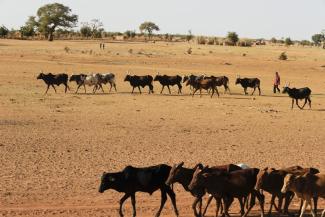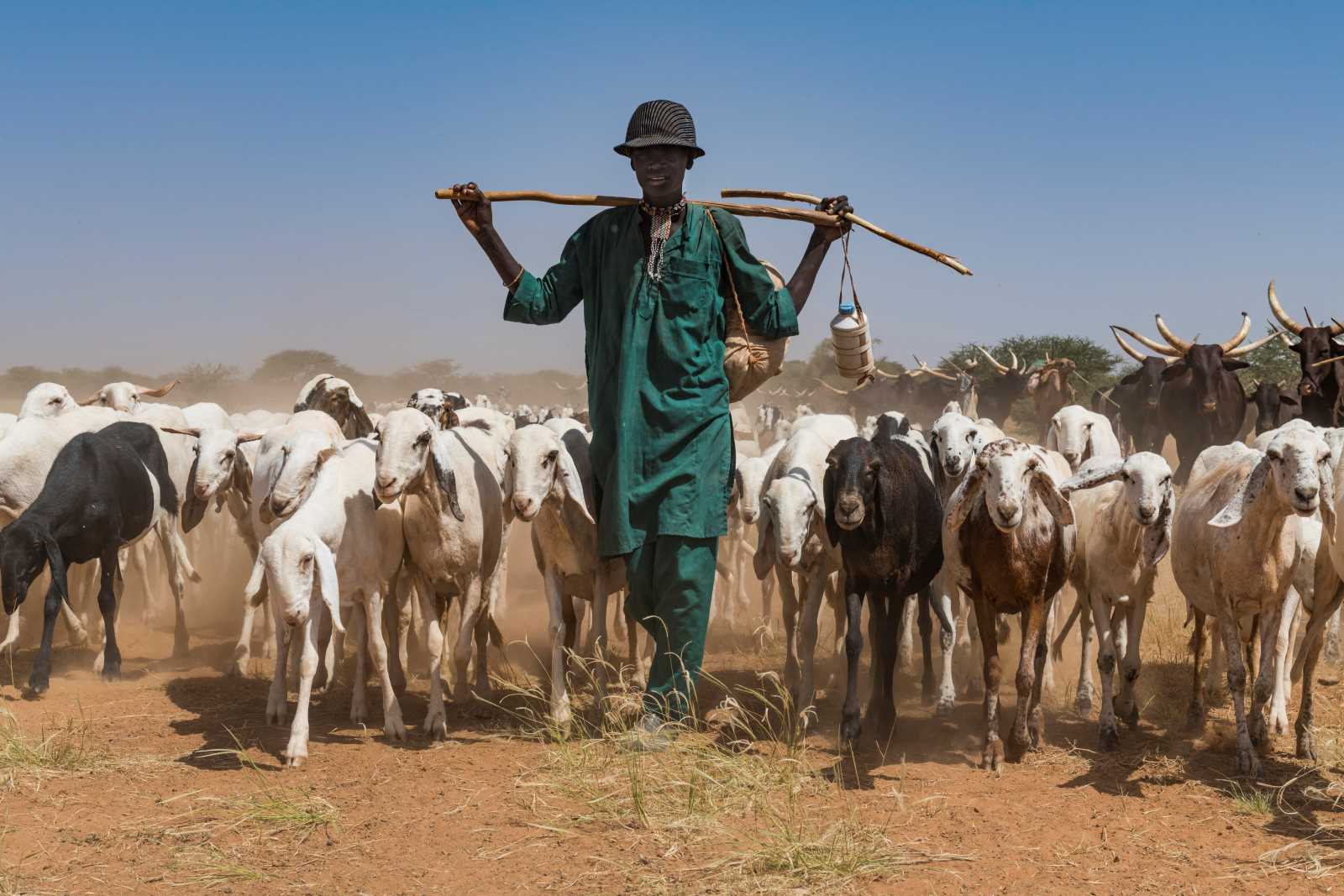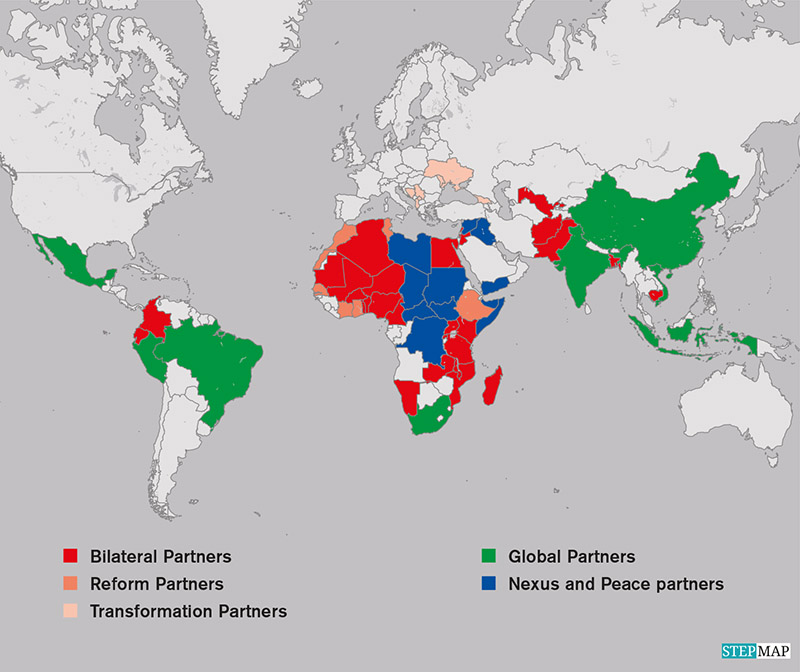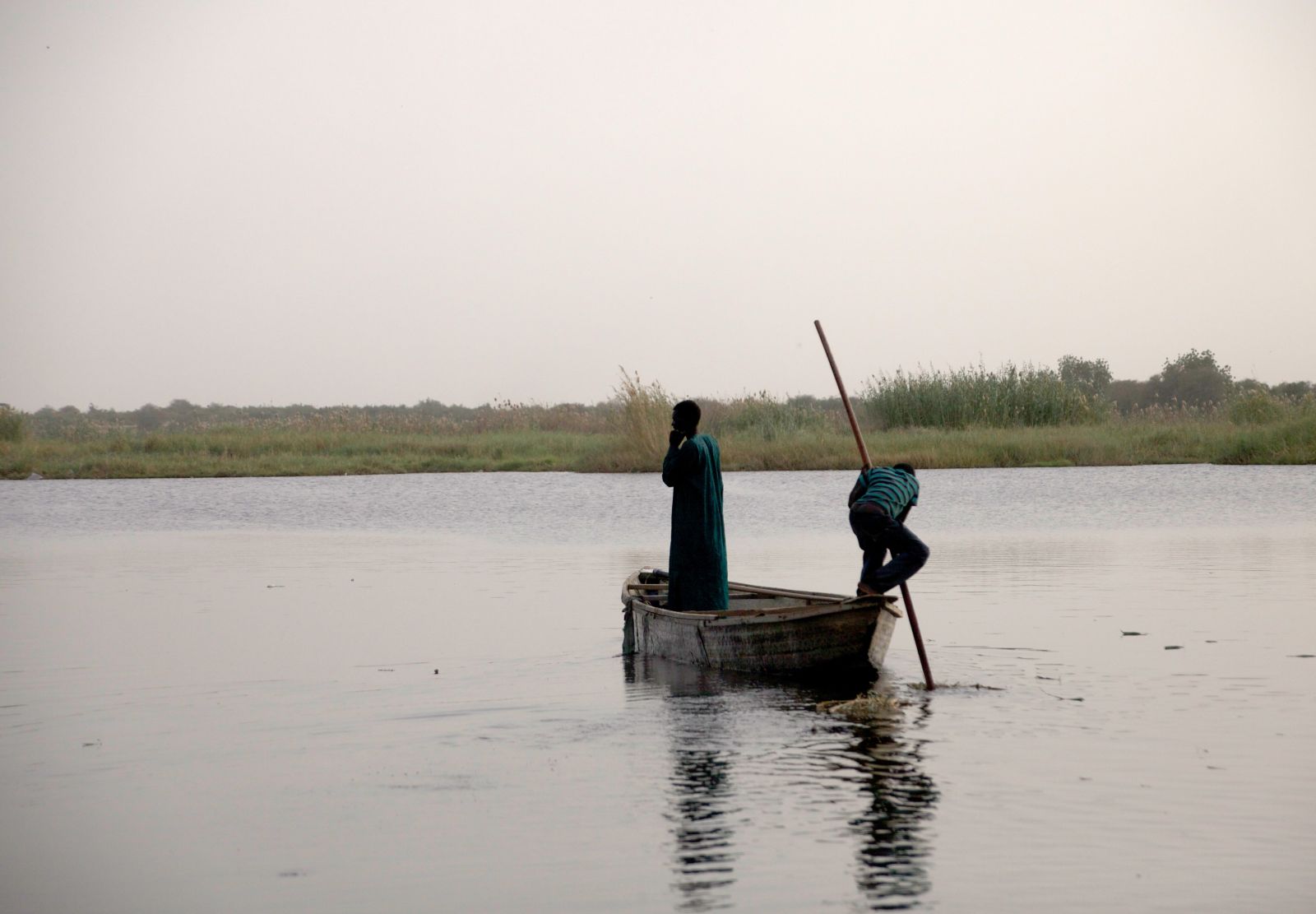Nomadic pastoralism
A complementary relationship turns competitive

In the past, the Sahel’s two predominant ways of life and modes of production – rain-fed farms and nomadic pastoralism, which is also called transhumance – complemented one another. In the rainy season from May to September, farmers in the southern Sahel till their fields, and herders spend this time in pastures to the north, where low rainfall makes the land unsuitable for agriculture.
After the harvest, herders migrate south with their livestock and are allowed to let their animals graze on the crop residues that remain on the fields. The animals’ manure then fertilises the soil. Migratory herding was once supported by transhumance corridors that provided herders with pastures, places to rest and watering holes. These corridors existed throughout the entire Sahel.
The causes of the conflict
For several reasons, this complementary relationship between farmers and herders has turned conflict-prone. Relevant issues include discrimination, the worsening resource scarcity, changes in production practices, an arms build-up and an increased demand for meat in west Africa’s wealthier countries.
Political elites, as well as international development agencies and researchers, consider migratory herding a backward, inefficient and environmentally damaging system of production. Accordingly, the lifestyle of migratory ethnic groups, particularly the Fulbe, is stigmatised. Politicians want to make nomadic peoples sedentary as that would also make them easier to control. For a long time, nomads’ contribution to the national economy was significantly undervalued. Only since the 1990s have people gradually begun to realise that, given the unpredictability of rainfall in the Sahel, mobility is an essential component of efficient and environmentally appropriate pastoralism.
Competition for land is increasing as a result of population growth, overuse of the soil and climate change. With support from local authorities, sedentary farmers are responding to these developments by continuously enlarging their fields and turning pastures and corridors into cultivated lands. It has therefore become impossible for herders to pass through the region without sparking conflict. In many cases, fields have been intentionally laid out in such a way that migrating herds must cause damage. Local authorities use these “trap fields” to extort excessive compensations and penalties from herders.
Rural systems of production are changing moreover. Herders have built villages and begun to cultivate fields, whilst some crop farmers are now raising livestock and fertilising their fields themselves. At the same time, the lack of resources is forcing migratory herders to move further and further south. Since the 1980s, they have been crossing into Nigeria, Benin and Togo, where they spend a part of the year in forests. This practice has led to major conflicts with local authorities, municipalities and crop farmers.
The conflict between herders and farmers was also greatly exacerbated by the emergence of the profession of livestock feed dealer in the 1990s. Feed dealers come primarily from farming families. They gather the crop residues from the fields and bring them to the cities, where they sell them to urban livestock owners. One result is that no fodder remains on the harvested fields for the migratory herders’ animals.
A race has evolved to get hold of the crop residues. The authorities are trying to regulate the situation by assigning each region a date from which on livestock owners are permitted access to the fields. This date is hotly contested every year. Currently violent clashes are occurring between crop farmers – or their accomplices among the authorities – and herders. Arbitrary arrests of shepherds, theft of livestock and extortion are common as well.
The Sahel countries of Niger and Mali are haunted by political instability. Accordingly, herders have begun arming themselves more and more heavily. Nomads have always carried weapons in order to protect themselves and their herds. As a result of the rebellions and civil wars in Chad and recently in Libya, the availability of military weapons increased dramatically in the region. Nowadays it is typical for shepherds to carry guns, often even assault rifles.
Motivated primarily by economic concerns, Sahel countries began re-evaluating livestock breeding in the 1990s. Livestock breeding has become an important business sector because of growing meat demand in neighbouring countries to the south, particularly Nigeria, Ghana and Côte d’Ivoire. Livestock breeding has become Niger’s second-largest industry after uranium production.
Since the 1990s, local elites have invested heavily in livestock, so animals are no longer owned only by traditional pastoralist groups like the Fulbe and Tuareg, but rather by rich, influential and “invisible” business people who are well connected to government officials. These “new” livestock breeders use their influence to – often illegally – acquire pastures, watering places and sometimes even land that has been set aside for crop farming. Such land grabbing has created new areas of conflict between modern and traditional stock breeders.
Turning crisis into opportunity
The re-evaluation of migratory herding has had a positive result however: The practice is gaining appreciation in Mali, Niger and Burkina Faso. Laws are changing and administrative structures are emerging that facilitate sensible resource management and constructive conflict resolution.
People are more and more realising that the conflicts cannot be solved by authoritarian means. In Niger, an exemplary participatory and inclusive structure has been created to manage resource conflicts in a sensible way. Projects by the non-profit peace and development organisation EIRENE and the GIZ have trained representatives of herder and farming communities as well as traditional leaders in non-violent conflict resolution. These projects have contributed to creating structures for dialogue and mediation.
According to Nigerian and Malian livestock-breeder organisations, tensions are easing in Niger, Burkina Faso and Mali. Nevertheless, the current crisis in Mali represents an enormous impediment to progress, since many herders are leaving the country and thus increasing pressure on neighbouring states. Political instability, possible droughts and the new trend towards privatising communal rural resources also significantly increase the risk of destabilisation and escalation.
Günter Schönegg works for the international Christian service for peace EIRENE in the context of Germany’s Civil Peace Service, which is designed to manage and prevent conflicts in a non-violent way. The government funding for the Civil Peace Service is managed by Engagement Global.
schoenegg@web.de











